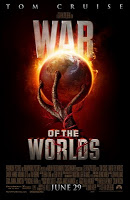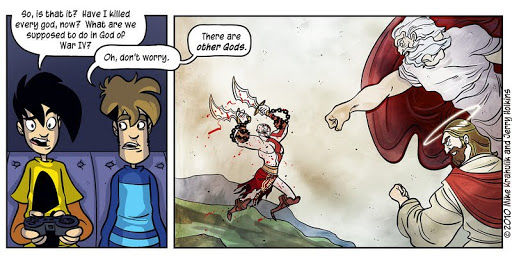This post has not been edited by the GamesBeat staff. Opinions by GamesBeat community writers do not necessarily reflect those of the staff.
Editor’s note: Video games have a long history of pitting players against a god-like end boss or putting them at odds with a religious sect. Ben highlights several recent releases and suggests that this trend is back and more vibrant than ever. Is killing god in games problematic? -Rob
As the Easter/Passover holiday weekend came to a close, I was reminded of a take on religion that’s begun to permeate our popular culture — film to be sure, but video games, too.
Every so often, video game trends give us new enemies to face without feeling too guilty about destroying their throngs of followers — Nazis, zombies, Nazi-zombies, etc. — but it seems as if the new final boss of choice is god.
I first noticed this playing through Demon’s Souls. To save the kingdom of Boletaria from The Old One and his demons unleashed upon a power-greedy people, I chose a Temple Knight. After all, what could be a better choice for saving the world from demons than a soldier of god?
But as the game progressed, I slowly realized through the exploratory narrative that the god from whom my character received his holy strength was, in fact, The Old One! In the end, the game gives you the choice of either joining The Old One as one of his demons or killing him.
Kill god?!
Perhaps this hit home more for me because of how much I had vested in my character when the time came to make that choice, but the concept of a devout, religious follower killing his own god blew my mind!
 Last year, I gave a presentation at an academic conference about the American-cinema version of a genre of 19th Century British Literature — the invasion-scare story. Basically, the Empire became so confident in its dominion of the world that its fiction began to portray threats to Queen and Country, such as Dracula and H.G. Wells’s War of the Worlds.
Last year, I gave a presentation at an academic conference about the American-cinema version of a genre of 19th Century British Literature — the invasion-scare story. Basically, the Empire became so confident in its dominion of the world that its fiction began to portray threats to Queen and Country, such as Dracula and H.G. Wells’s War of the Worlds.
My presentation suggested that America faces a similar consciousness, as evidenced by movies like Cloverfield and Steven Spielberg’s War of the Worlds. I also suggested that this trend was already on the outs, and nature was becoming the threat of choice (see The Day the Earth Stood Still remake, The Happening, Wall-E, etc.).
I would now argue that this trend continues to evolve, with these films taking on god and religion as the ultimate threat to man, like in The Book of Eli, Legion, and The Clash of the Titans.
 And it’s begun to permeate our games, too. While a god or religion as the enemy in video games is not entirely a new plot device — even the relatively “new” God of War series is already five years old — the sheer number of games to employ this in the past year is indicative of the times.
And it’s begun to permeate our games, too. While a god or religion as the enemy in video games is not entirely a new plot device — even the relatively “new” God of War series is already five years old — the sheer number of games to employ this in the past year is indicative of the times.
The God of War trilogy comes to a close with the death of Zeus. Final Fantasy 13 pits its cadre of heroes against a theocratic government. Dante refuses to accept his death and a one way trip to Hell for his sins, and instead journeys through the nine circles to rescue his fiancée, kills the overseers, and decides or himself who should be absolved and damned.
Bayonetta faces off against angels; Darksiders sees one of the four horsemen of the apocalypse trying to clear his name for “accidentally” ending the world. Momohime travels from Hell to Heaven — battling gods and demons alike — just to try out the unstoppable sword style of her possessor with her Muramasa blades.
The list — I’m sure — could go on. But I’m hard pressed to think of many games from previous generations to so feature religion and/or god as the final boss.
Granted, religious themes and allusions in video games are certainly not new. Infamous’ Cole loosely resembles Christ. Bioshock demonstrates man’s inability to live without religion when Jack stumbles across boxes of smuggled Bibles. Little King’s Story continually pokes fun at religion with its Church of Soup, whose followers end prayers with “Ramen.” Even the Legend of Zelda series introduced religion into the equation with its Super Nintendo iteration.
But unlike in film, which went through a period of embracing religion (The Ten Commandments, Ben-Hur, etc.) before destroying it, video games seem to have jumped straight to the end. And I feel like this should bother people.

My sentiments exactly
But, as the Penny Arcade strip suggests above, could we have already reached the stage in which deicide has become so commonplace that even media-watchdog groups would rather jump all over God of War’s violence instead of its plot of killing gods? Are we too caught up in our über realistic graphics and gameplay innovations to notice what we’re up to? Is this trend too subtle to notice? And if it is, what does that say about us and our society?
I don’t have the answers, and I’m not going to pretend I do — just as I’m not going to pretend I’ve played all those games I mentioned. These are just some observations about which I’m curious, because the original King Koopa pales in comparison as an epic boss fight to battling the Dragon God in Demon’s Souls. And if we can kill god in our games, what does that leave us with afterward?
Questions? Quibbles? Controversies?
